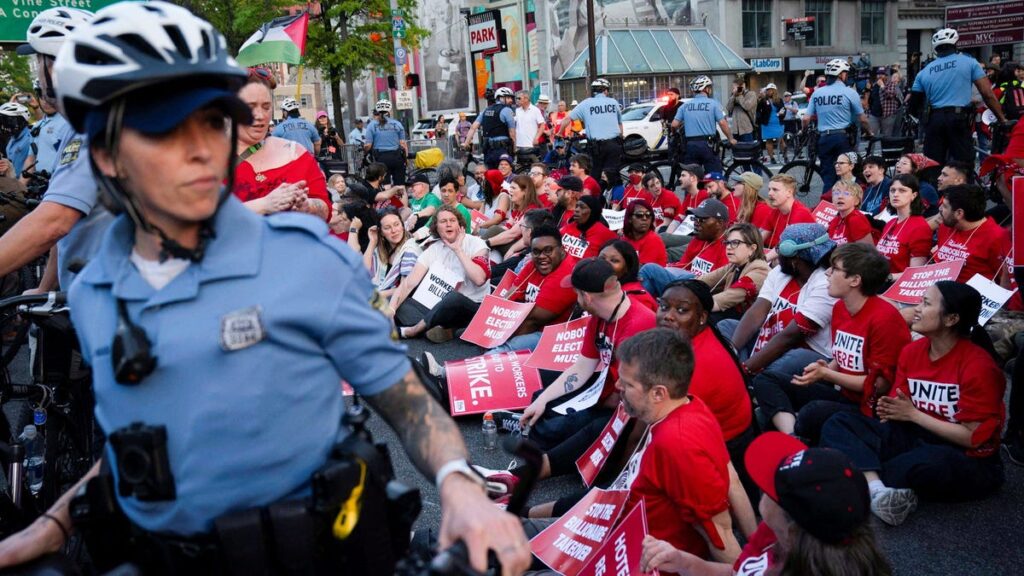As tensions rise in the political landscape, a significant movement is set to unfold across the United States this June 14, aligning with Flag Day and coinciding with the Army’s 250th anniversary. Dubbed the ‘No Kings’ protests, these demonstrations are being organized in response to former President Donald Trump’s upcoming birthday parade, further fueled by an increasing desire of citizens to reclaim democratic values.
This nationwide series of protests centers around the mission to dismantle the imagery of authority represented by Trump’s movements and to ensure that the sentiment of democracy prevails over authoritarianism. The flagship event will take place in Philadelphia, while similar protests are expected in numerous locations across Pennsylvania and the rest of the country.
What Are the ‘No Kings’ Protests?
Originating as a grassroots effort, the ‘No Kings’ protests are driven by the belief that the country should not be ruled by a single individual, particularly not in a fashion that echoes monarchy. The objective is clear: to display solidarity among citizens united against what organizers describe as a “lavish display of dominance” by Trump, especially during the week when he is set to mark his 79th birthday.
The phrase “No Kings” plays on the notion of rejecting the idea of a king, positioning the movement firmly in favor of democracy and freedom. The protests aim to send a nationwide message: that Americans will not passively accept the authority or extravagance that Trump represents.
Philadelphia: The Flagship Event
The epicenter of the No Kings protests in Pennsylvania will be located at LOVE Park in Philadelphia. This event, scheduled for Saturday, June 14, between 12 p.m. and 3 p.m., is being hosted by various activist groups, including Indivisible and the 50501 Movement, both of which have played a critical role in mobilizing citizens against Trumpism.
In addition to the main rally, organizers have arranged multiple pre-gatherings at train stations to encourage attendance and enhance collective engagement before marching. Attendees are expected to sign up online, harnessing digital tools to gauge participation and improve organizational efforts.
- Where: LOVE Park, Arch and North 15th Streets, Philadelphia
- When: Saturday, June 14, from 12 p.m. to 3 p.m.
- Pre-gatherings: 9:30 a.m. at Norristown and Lansdale Train Stations
Statewide Participation and Significance
While Philadelphia serves as the primary location for the protests, several other rallies are set to occur across Pennsylvania, demonstrating a unified voice across the region. From the Delaware County Courthouse to Springfield and beyond, each gathering carries the same theme of defiance against Trump’s governance and the extravagance that accompanies it.
- Delaware County: Delaware County Courthouse, 12 p.m.
- Langhorne: Congressman Fitzpatrick’s office, 12 p.m.
- Springfield: Baltimore Pike and Route 320, 1 p.m.
This palpable sentiment of unease about personal freedoms and the integrity of democracy continues to fuel local gatherings. Across city and state borders, citizens are invited not only to engage in protest but to unite under the banner of shared values, further enhancing the protest’s core message.
The Broader Context: National Movement
The No Kings protests form part of a broader movement that includes many groups advocating for progress and justice, such as Indivisible, known for its focus on impactful grassroots organizing. Additionally, the 50501 Movement — named for its aim of mobilizing protests across all 50 states at once — has gained traction with social media-driven activism that is particularly resonant in the current political climate.
This nationwide effort highlights the urgency for many Americans who are sensing a vital need to reclaim agency in the democratic process. As organizers come together to strategize and mobilize supporters, they also seek to solidify the importance of collective action in ensuring a government that reflects the will of its people.
Differences in Local Responses
As the protests expand across various cities and states, each region will exhibit unique local expressions of dissent. For example, while the Philadelphia protests feature a more organized and signature approach, other areas may choose more spontaneous or informal gatherings.
Moreover, some cities will likely coordinate with local civic events or community gatherings, using these opportunities to promote the ‘No Kings’ message effectively while also supporting community leadership.
Conclusion: The Call to Action
The No Kings protests promise to be a significant moment in the ongoing dialogue about democracy and authority in America. As shades of unrest continue to echo in cities like Los Angeles and Philadelphia, the movement aims to galvanize participation across various demographics and ages.
“This country doesn’t belong to a king — and we’re not letting him throw himself a parade funded by tens of millions of our taxpayer dollars.”
Ultimately, the message is clear: the citizens of the United States will not accept undemocratic governance nor celebrate displays of authoritarianism. As the protest date approaches, individuals, communities, and organizations are encouraged to engage deeply with this movement and reflect upon their roles as active participants in democracy.

